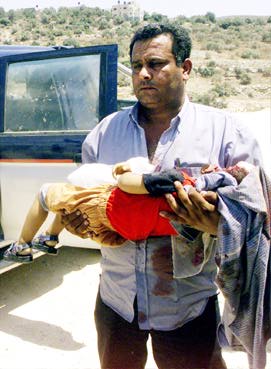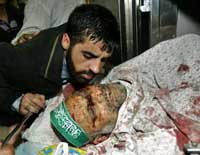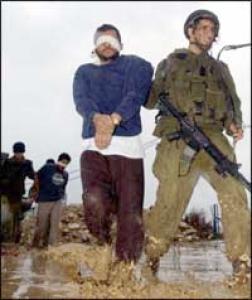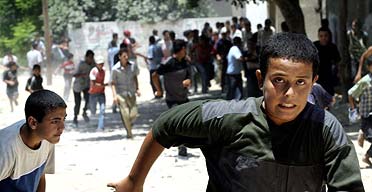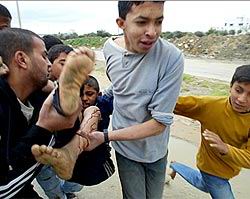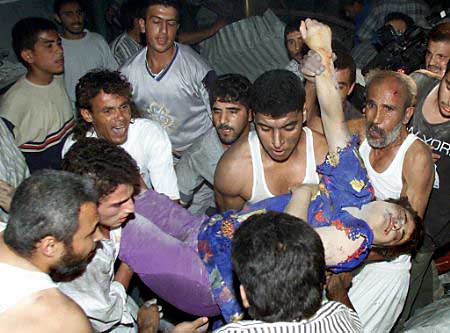| Israel Kills Refugees
What's up with Israel, eh?
Attacking refugee camps? Killing civilians? Its no wonder they have suicide bombers. They kill civilian Palestinians (refugees no less!) and then expect Palestinians to be "happy and peaceful"..? Okay they're looking for "terrorists"... but killing civilians is not going to make it better. It will only make it worse. So with only "one" Israeli source (who didn't have any proof) who said there was actually terrorists in the refugee camp, the Israeli Army attacks. One source with no proof. 10 dead Palestinians later, they found no "terrorists". Just dead children. Meanwhile Israel is building a wall (how Communist-Russia of them)... to keep out Palestinians. Meanwhile many Palestinians live on the Israel side of the wall. So whats the point? The point is that after the wall is built, the Palestinians who live on the Israeli side of the wall will be forced off their land and into refugee camps. So yeah. Killing refugees for fun and profit. Way to go Israel (sarcasm)... This isn't the first time countries have used such "gestapo" tactics to take over land. The United States killed 90 million Native Americans during the 1700s and 1800s. The Native population of North America before British and French colonists arrived was over 110 million. So now, on a much smaller scale, Israel is taking over Palestinian land. They put Palestinians in refugee camps, steal their land, raid the camps and kill civilians What a great plan... the only side-effects is that it is "selective genocide" and it provokes terrorism.
How do you stop someone who wants to commit suicide? You can't. There is no way. The best way is to prevent them from WANTING to do it in the FIRST PLACE. So how do you do that? After all, if you are unemployed, have no land and your family has been killed or cut-off, wouldn't you think about suicide too?
Israel attacks refugee camps, killing over 13 refugees and injuring 50 others. Sunday 07 March 2004, 10:03 Makka Time, 7:03 GMT:
Israeli forces have raided two Gaza refugee camps, killing at least 13 Palestinians and wounding over 50 more. Witnesses to the Sunday raid said soldiers shot dead a 15-year-old and other young men who attempted to halt the Israeli military as it forced its way into the camp. Dozens of armoured military vehicles took part in the sweeps for Hamas members in the al-Buraij and Nusairat camps in the central Gaza Strip. Tanks choked the main roads to the camps and explosions thundered in the early morning. Israeli commentators have speculated the army would step up operations against Palestinians in the Gaza Strip before Prime Minister Ariel Sharon puts into motion an evolving plan to evacuate some illegal settlements in the area.
Killing refugees:But according to an Israeli military source, the raid was a "pinpoint operation against the terrorist infrastructure in the central Gaza Strip." The source said Palestinians from the refugee camps in the area have been attacking Israeli convoys and firing mortar bombs and Qassam rockets at Jewish settlements. The raid comes after Palestinian resistance fighters mounted an elaborate but unsuccessful attack on Saturday at the Israel-Gaza border in which fighters used fake Israeli jeeps.
Failed operation:
However Israeli border guards opened fire on the first jeep, killing two men in the lead vehicle before fighters could launch their attack. The second jeep exploded prematurely – killing its occupants and two policemen uninvolved in the attack. For thousands of Palestinian labourers, Erez is a gateway to coveted jobs in Israel and in an Israeli-run industrial zone at the crossing. There were no Israeli casualties in the Erez operation.
Who stands to benefit from civil unrest in Iraq?
Number of pollers : 24984
|
|
|
Palestinians fight barrier silently
BUDRUS, West Bank—When the Israeli backhoes and bulldozers first threatened this picturesque Palestinian hamlet four months ago, the people of Budrus had to think fast. The heavy machinery, they were told, would soon be scraping clean 1,000 dunams (about 250 acres) of olive groves from the edge of town, clearing a path for the separation barrier to follow. The town was in shock. "We knew we had to do something. But we didn't have a lot of time to think about it. It was a crisis," remembers Ayed Morar, 42. From Budrus to Rantis, faction leaders from the nine Palestinian villages northwest of Jerusalem, whose land was most endangered by the infamous fence, converged for an emergency summit. Their stark choice: how to fight the seemingly inevitable. A decision was taken that day that might seem unlikely, given the ferocity of the past 3 1/2years of bloody intifada. The factions agreed to battle with words, not weapons. This corner of the uprising would raise no guns in its war against the Israeli barrier. So began a campaign of peaceful protest that has made Budrus the talk of the West Bank, with a fame that far exceeds its tiny population of 1,200 people. The Popular Committee to Resist The Wall was struck, with one representative from each of the nine villages, and Morar was named its leader. The nearly daily demonstrations that have drawn increasing television coverage in the months since that fateful decision are reminiscent of a more benign intifada, much like the one that played out long before suicide bombs and the aftermath of Sept. 11 turned the conflict on its ear. Mass rallies saw the whole of Budrus, everyone from toddlers to grandparents, gathering in the targeted fields after daybreak each morning, often staying until sundown. They linked arms and used their bodies as a human fence against the steel-and-razor wire version trying to plant itself in their place. The occasional rock is thrown, the occasional rubber-coated steel bullet is fired from the Israeli side. But despite even the occasional clouds of crowd-dispersing tear gas, the movement spawned at Budrus has the distinct whiff of de-escalation. "I am so proud of my people," said Morar. "We chose non-violent protest knowing we had to have absolute unity. And we got it. All the people of Budrus are together on this. "We have come to realize non-violence is the key. The Israelis know well how to use Apache helicopters, planes and tanks. We are no match for them that way. But they don't know how to contend with this." Budrus claims partial victory to date: the heavy equipment is silent now, as Israeli government planners weigh alternatives to the original plan to fence through the town's olive groves. The new route, Morar said, is certain to take less of Budrus' land — how much less is not yet known. On temporary leave from his job as a manager with the Palestinian Authority Interior Ministry, Morar cannot contain his disgust with the lack of support for the rump movement from his own government. "We started this on our own, but once it got rolling we had support from everywhere," he said. "International protesters have joined us, along with many peace supporters from Israel. "We even had a member of the Swedish parliament here at one point. But through all that, not a single Palestinian minister has come to see what is happening. "It is shameful. We ask them for nothing but moral support. And we don't even receive that." Morar, who is familiar with the teachings of Mahatma Gandhi, said the lack of official Palestinian support underscores the failure of leadership. "It is a mistake even to say we have an intifada," he said. "What we have is nothing. Our weapons bring us the greatest misery." Whether the Budrus factor is liable to be embraced beyond this small cluster of West Bank villages is very much in doubt. Grassroots protest does not come easily to Palestinian politicians, said Palestinian legislator Hanan Ashrawi. "I have tried to get various senior figures to come down to the checkpoints," Ashrawi said. "But the prevailing attitude is disdain for such an idea." But Morar said the Budrus movement is nevertheless beginning to trickle out to other communities to the south of Jerusalem that fear facing the future path of the fence as it wends its way south.
| |
